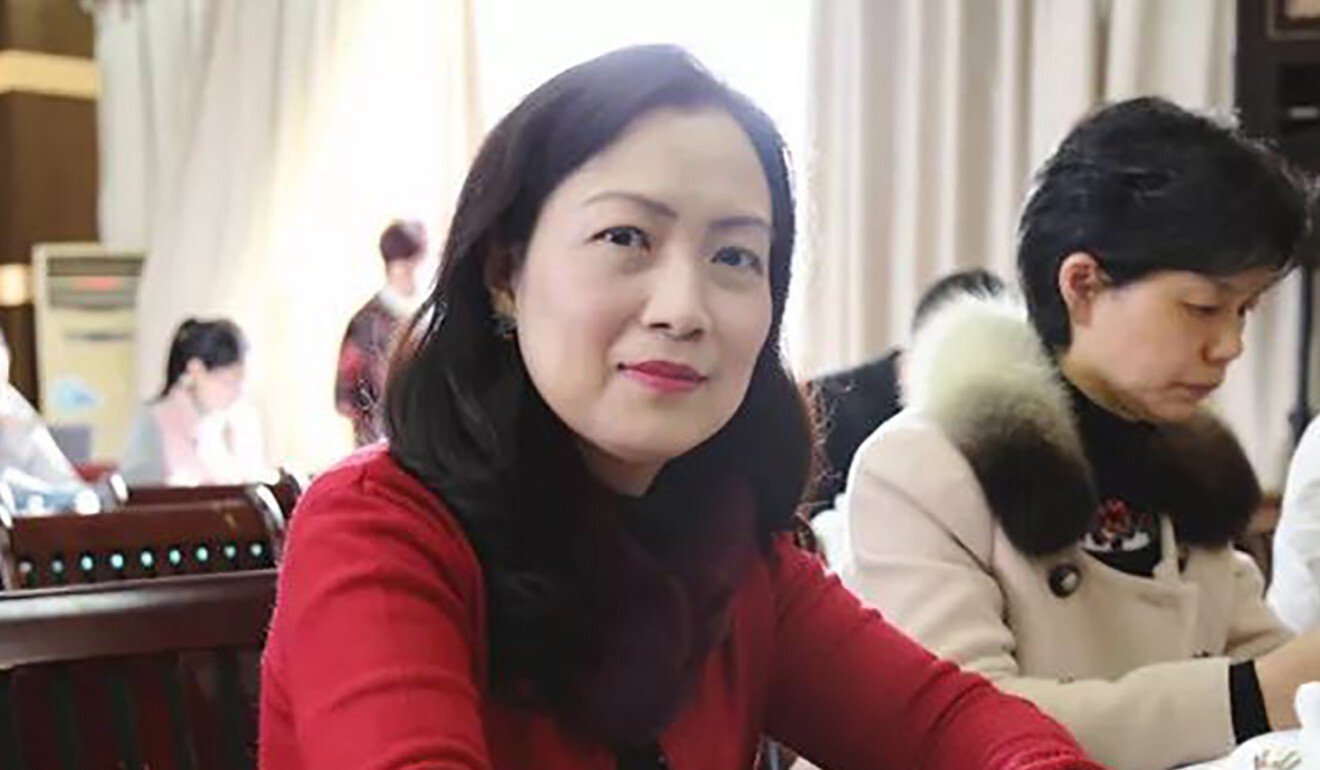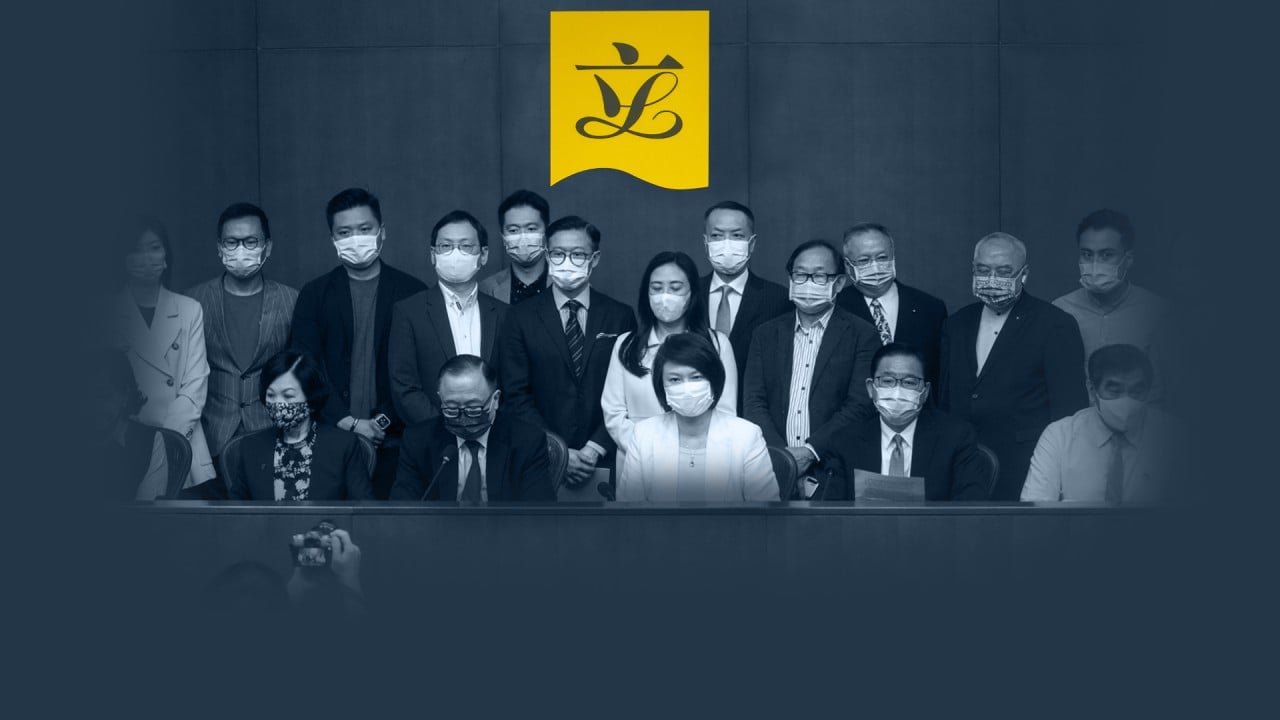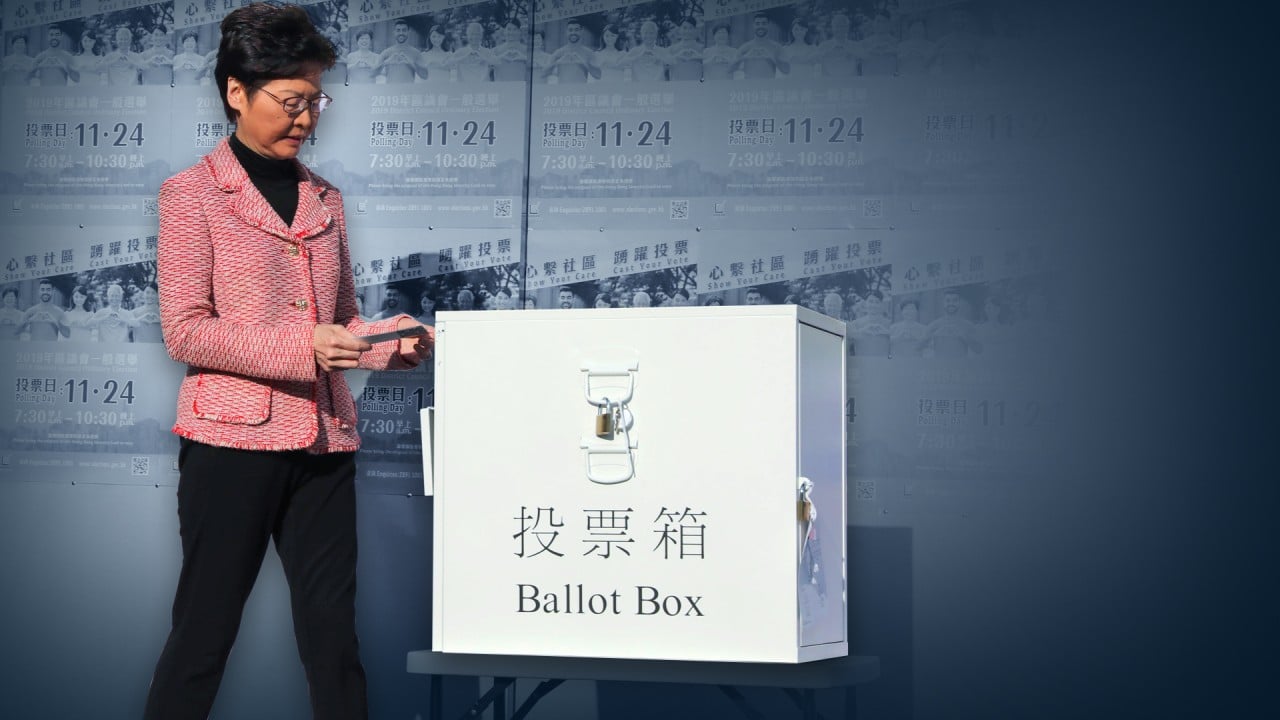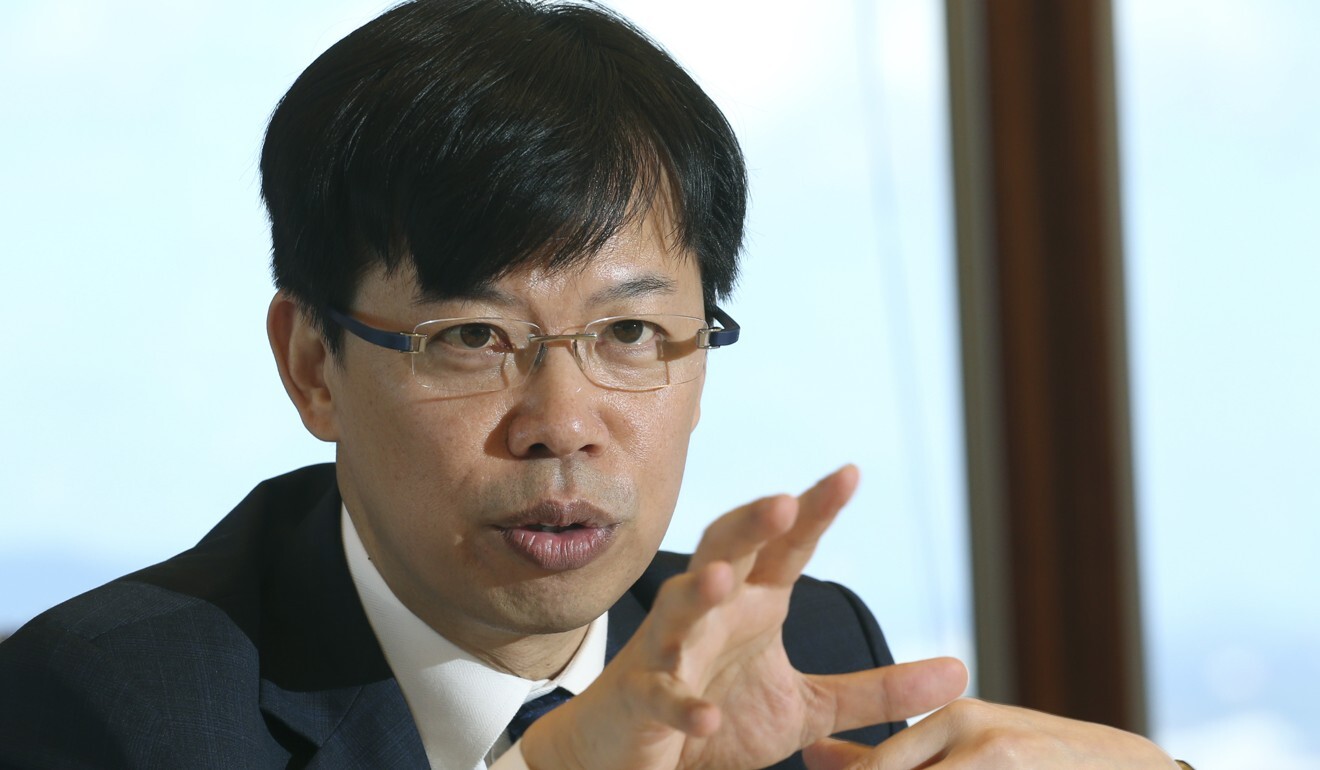
There are new political elites in town. Who are they, and will they displace the veteran Beijing loyalists in Hong Kong’s Legco poll?
- Emerging business figures mostly from mainland firms set to flex muscle at coming poll, with record number of them signing up in race for seats
- With newcomers expected to cause waves through mere presence or issues championed if elected, critics fear veterans’ influence may be diluted
As nominations for the Legislative Council election close on Friday, one noteworthy trend is the growing prominence of aspiring candidates from mainland Chinese enterprises and the professional classes. Will they compete with the traditional pro-Beijing bloc? Ng Kang-chung and Jeffie Lam look at the issue in the first of a three-part series on the Legco nominations.
Simon Hoey Lee is a rising star in Hong Kong’s pro-establishment camp, even though he has no party affiliation.
A legal expert on the Basic Law, the city’s mini-constitution, Lee was also once tipped to be the next home affairs undersecretary when Carrie Lam Cheng Yuet-ngor took up the city’s top job in 2017.
Four years later, he is among a band of emerging business elites from mainland China’s enterprises who are set to flex their muscle in Hong Kong’s political scene as a record number of them have signed up to vie for seats in the legislature at the election next month.

Lee attributed their growing prominence in politics to the changing nature of Hong Kong’s society and economy.
“Mainland companies are an important force of Hong Kong’s economy,” said Lee, also a member of a working group on the Belt and Road Initiative under the Counsellors’ Office of the State Council.
“With their massive scale, they are going to play a bigger role in not just the city’s future development but also that of the world’s.”
Property alliance chief in Legco bid after Beijing rejects father-son duo
Some veterans in the traditional pro-Beijing camp have welcomed as a “healthy development” the arrival of these new elites – comprising many Hongkongers who work in state-owned enterprises along with some mainlanders who actually have lived in the city for at least seven years to qualify as permanent residents. But analysts have said this would require the very camp to also accommodate them, with the veterans’ influence inevitably “diluted” by the new elites.
Others see it as a natural outcome of Beijing wanting mainland enterprises to play a bigger role in Hong Kong affairs, including offering help to the disadvantaged in society. Several of these mainland companies’ representatives were present, for example, when Beijing’s liaison office director in the city, Luo Huining, launched his first outreach event, visiting builders at a quarantine centre just a month after he took office in early 2020. Some were also in attendance at other drives, such as one in late September when Luo reminded them to fulfil their corporate social responsibility in Hong Kong.

As of Thursday, at least nine senior executives from companies with mainland Chinese backgrounds had signed up for the December 19 Legislative Council election, compared with just three in the 2016 poll.
Among noteworthy figures was Tan Yueheng, chairman and executive director of Bocom International Holdings – a subsidiary of one of the oldest banks in China, the Bank of Communications – who is hoping to be an Election Committee lawmaker. The committee has 40 seats reserved for it, with lawmakers voted either from its own ranks or outside.
Carmen Kan Wai-mun also put forward her bid in the Election Committee constituency. Kan, a lawyer, is now general counsel at Bank of China (Hong Kong). She is also a vice-chairman of the All-China Women’s Federation Hong Kong Delegates Association.

Another big gun contesting in the same constituency is Chan Pui-leung, general manager of China Taiping Insurance (HK). The company is under the China Taiping Insurance Group, a financial enterprise under the supervision and administration of the finance ministry.
Lee, who is also making a bid in the same constituency, downplayed suggestions that the emergence of the new “mainland forces” would dilute the powers of the pro-establishment bloc.
“This new bloc may draw eyeballs, but apart from the participation of mainland company leaders, there are also two Caucasians, alongside more professionals, throwing their hats into the ring this time,” he said, referring to Lan Kwai Fong Group chairman Allan Zeman and former government official Mike Rowse, both of whom have given up their foreign passports for Chinese citizenship.
Hong Kong graft-buster arrests 3 over calls to cast blank ballots in Legco poll
But the new pro-Beijing elites do not all hail from the big corporations or want to be in the Election Committee sector. There are also at least two “mainland-born Hongkongers” – Gary Zhang Xinyu of New Prospect for Hong Kong, and Wu Chili of University of Science and Technology. They are seeking to run in the New Territories North constituency and the functional constituency of technology and innovation respectively.
While both have long established roots in Hong Kong, the perception that they are gangpiao or “Hong Kong drifters” has been surfaced by analysts and critics alike. Gangpiao is a term used to describe young and educated mainlanders staying on for work after graduating from university in Hong Kong or who moved to the city for their careers and ended up settling in longer than initially planned.
Zhang, an engineer by profession, raised eyebrows when he unveiled that he had obtained nominations from political heavyweights, such as microbiologist Yuen Kwok-yung and Charles Li Xiaojia, the former chief executive of the Hong Kong Exchanges and Clearing.

05:10
Hong Kong's revamped electoral system bolsters pro-Beijing influence in key decision-making bodies
Having moved to Hong Kong from the mainland at the age of 10, Zhang said he studied, worked and raised a family in the city. Hence, he was rooted in the city and not a gangpiao. He certainly did not want his newly founded group to be one that represented only the interests of the “Hong Kong drifters” or what some called more kindly, the “new Hongkongers”.
“I am here to serve Hongkongers. I have never met any residents in the community who come over and ask when I moved to Hong Kong,” he said.
Zhang, who will run head-to-head with Edward Lau Kwok-fan of the pro-establishment Democratic Alliance for the Betterment and Progress for Hong Kong (DAB), as well as Yuen Long District Council chairman Sham Ho-kit, said he was open to communicating with the traditional Beijing-friendly politicians. But he insisted he had not coordinated with any of them for the coming election.
Indeed, sources have said that both sides – the traditional pro-Beijing elites and the newcomers – have yet to make informal or formal pacts. How exactly they will interact in the legislature remains to be seen. But expectations are that the new pro-Beijing elites will cause waves, whether just by their mere presence or the issues they will champion if they were to be elected.
Talks under way to set up polling stations for Hong Kong election at border
Newcomers and old-timers working as one?
Ip Kwok-him, former DAB legislator and now a member on Chief Executive Carrie Lam’s quasi cabinet, the Executive Council, said he did not expect the traditional pro-establishment camp to find it difficult to work with the newcomers.
“They are business elites and they will express views from their perspectives while other legislators will also express theirs. It is what a healthy Legco should be like. Members exchange their different views to help make government policies that better suit the needs of the people.”
He also dismissed suggestions that the influence of the traditional pro-establishment faction would be diluted.
“There is no question of us competing for political influence. We, as well as other members, are to serve the interests of Hong Kong and it is all legislators’ responsibility to cooperate with one another to help improve governance,” Ip said.
However, Hui Ching, a research director of policy think tank Hong Kong Zhi Ming Institute, felt it would be a matter of time before the traditional Beijing loyalists would find their impact and influence diminished.
“I am not saying that there will be serious infighting in the pro-establishment camp, which would unlikely be allowed by Beijing,” Hui said. “But the design of the electoral system by Beijing has also shown that Beijing wants its proxy to have a bigger say in Hong Kong affairs.”
The debate and engagement between both sides over their ideas would be competition, Beijing-style, he and others said.

Under the Beijing-led overhaul of Hong Kong’s electoral system, announced in March, the city’s legislature will expand from 70 to 90 seats, with directly elected positions cut from 35 to 20. Some 40 seats will be returned by the revamped Election Committee and the remaining 30 by trade-based functional constituencies.
Beijing officials had said the changes were aimed at ensuring that political power in Hong Kong was firmly in the hands of patriots who posed no threat to national security.
“The traditional leftists, like DAB, do not know much about the nation and they have failed to produce any elite figures in Hong Kong despite a few decades of being in the lead. So, Beijing may want to try another approach by inserting more top executives in mainland enterprises into Legco.
“In a sense, it is also natural as it can reflect the increased importance of mainland firms in Hong Kong’s economy,” Hui said. This was no different than in the colonial era when the interests of the Jardines and Swire empires were also represented in the then legislature and Executive Council, he noted.
Hong Kong opposition hopefuls clear first hurdle in Legco election bid
Lau Siu-kai, a vice-president of semi-official Beijing think tank the Chinese Association of Hong Kong and Macau Studies, said the higher profile of the new elites was to be expected as more now was being demanded of them.
“Few would deny they have become an important player in Hong Kong’s economic development. As a member of Hong Kong’s society, they should also play a part in serving the city,” he said.
According to Hong Kong Exchanges and Clearing figures, in 2020, of the 2,538 listed companies, 1,319 were mainland enterprises, with market value totalling about HK$38.07 trillion, or roughly 80 per cent of the total market capitalisation of HK$47.52 trillion of all listed companies.

04:21
How does Hong Kong select its government?
Luo praised them for showing social responsibility, citing their “good work” in helping to stabilise the market and securing jobs for young people during the Covid-19 slump.
While he did not cite specific figures, Lau said Luo lauded them as a way to nudge these mainland companies into playing a bigger role to help the Hong Kong government push its policies and take the lead to encourage other private firms to do the same.
“The mainland firms are not aiming 100 per cent at profit maximising but are more willing and prepared to take up social responsibility,” Lau added.
“Unlike local private firms, mainland firms are more used to coordinating with Beijing’s policies and they can become a force to support the government policies especially on people’s livelihood, when needed.”
More interventions by Beijing?
Lau sought to quash talk that any increased presence of mainland enterprises in Legco would mean even more opportunities for Beijing to directly influence Hong Kong affairs. “They are still a small faction given that there are 90 seats in Legco, although we may see several more legislators with backgrounds in mainland enterprises,” he said.
In any case, it would not be the first time for mainland enterprise representatives to be in Legco.

For example, Ronick Chan Chun-ying, a senior figure at Bank of China (Hong Kong), is seeking re-election in the finance functional constituency. Tourism sector legislator Yiu Si-wing also comes from China Travel Service (HK) where he is the chairman. Yiu is not running for another term.
Yiu laughed off the suggestion that he had been speaking for Beijing’s interests in the legislature.
“I served Legco for nine years. I can say that I am more regarded as a lawmaker representing the tourism sector than as an executive from China Travel Service, not to mention speaking for Beijing’s interests,” Yiu said.
“There was never any pressure or any influence from Beijing on my Legco work. As a representative of the [tourism] functional constituency, I would speak for the sector in Legco. And as a legislator, I also serve the overall interest of Hong Kong,” he added.
Yiu said he had not encountered any issues cooperating with colleagues from the traditional leftist camp in the legislature.
China watcher Johnny Lau Yui-siu said it was only natural for the new force to rise to prominence when more mainlanders were settling in Hong Kong and with state companies playing an increasingly dominant role in the city’s economy.
“The mainland authorities actually do not have much confidence in local officials,” he said. “They would like to have someone who understands Beijing’s thinking to assist, or monitor, the local government. This trend is set to continue.”
But Lau expected the traditional pro-establishment bloc would neither be easily replaced by, nor have contentious ties or confrontations with the new emerging bloc.
“The traditional pro-establishment camp, which has spent years cultivating its support base, will not easily allow the transfer of votes to these newcomers,” he said.
Beijing, Lau said, had a bottom line: compete, yes; conflict, no.





